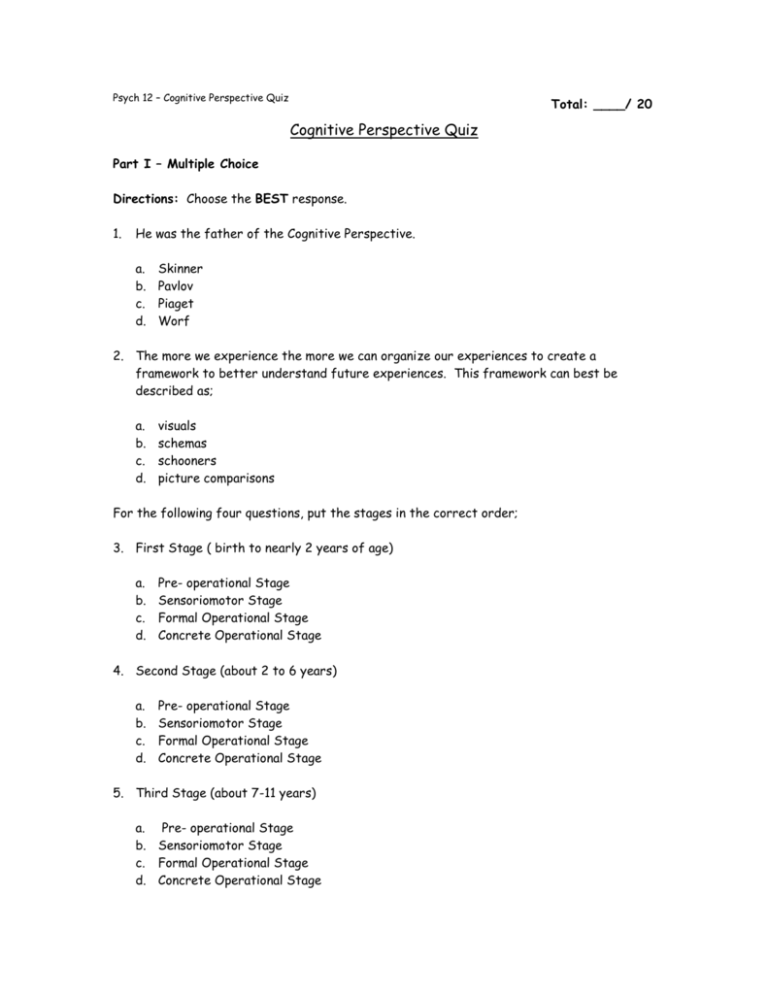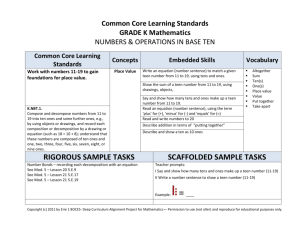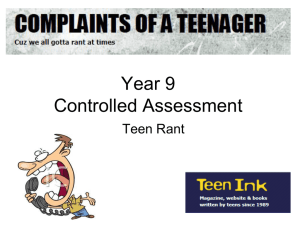Psych 12 – Cognitive Perspective Quiz
advertisement

Psych 12 – Cognitive Perspective Quiz Total: ____/ 20 Cognitive Perspective Quiz Part I – Multiple Choice Directions: Choose the BEST response. 1. He was the father of the Cognitive Perspective. a. b. c. d. Skinner Pavlov Piaget Worf 2. The more we experience the more we can organize our experiences to create a framework to better understand future experiences. This framework can best be described as; a. b. c. d. visuals schemas schooners picture comparisons For the following four questions, put the stages in the correct order; 3. First Stage ( birth to nearly 2 years of age) a. b. c. d. Pre- operational Stage Sensoriomotor Stage Formal Operational Stage Concrete Operational Stage 4. Second Stage (about 2 to 6 years) a. b. c. d. Pre- operational Stage Sensoriomotor Stage Formal Operational Stage Concrete Operational Stage 5. Third Stage (about 7-11 years) a. Pre- operational Stage b. Sensoriomotor Stage c. Formal Operational Stage d. Concrete Operational Stage 6. Fourth Stage (about age 12 to adulthood) a. b. c. d. Pre- operational Stage Sensoriomotor Stage Formal Operational Stage Concrete Operational Stage 7. The term ______________ can best be described as; “Out of sight… out of mind.” a. b. c. d. Object Permanence Egocentric Assimilation Schemas 8. The following picture is a psychological test to prove that very young children are ___________, or unable to see things from another person’s point of view. a. b. c. d. unaware assimilated schematic egocentric The following four questions relate to David Elkind’s 4 reality distortingqualities of early teens: Match the correct term with the provided description. 9. Is the result of teens tending to be over-sensitive to fairness and equality when they don’t realize the special treatment they expect for themselves. For example a teen may expect a teacher to “give them a break” on some overdue homework because they were at a dance the night before, but the same teen may get upset when they see another student making a homework deal. “Well you let Mary have an omit on that last assignment when she had to go to that funeral!” a. b. c. d. Imaginary Audience Personal Fable Hypocrisy Pseudostupidity 10. Is when a teen feels that his or her private and personal experiences are totally unique. For example, when a teen has their first crush, they believe that it must be true love and when their parent tries to tell them different, they won’t listen because they don’t believe that their parent can really understand how strong their feelings are. “But Mom…. You don’t know how it feels to be love!! You don’t understand!!” a. b. c. d. Imaginary Audience Personal Fable Hypocrisy Pseudostupidity 11. Is an over reliance on the power of logic (faulty logic). A teen may become judgmental towards others because their limited knowledge of the situation doesn’t make sense to their logic. For example, a teen may not be able to comprehend that an alcoholic may have a tough time stopping drinking. To the teen, they may believe that if drinking alcohol becomes a problem, then you should just be able to stop. “If drinking is bad… then just stop.” a. b. c. d. Imaginary Audience Personal Fable Hypocrisy Pseudostupidity 12. Occurs when a teen feels that he or she is the focus of everyone’s attentions. The obvious example would be the degree of embarrassment felt by a teen after they stumble in the hallway “Oh my god…. I’m SOOOO embarrassed!!” a. b. c. d. Imaginary Audience Personal Fable Hypocrisy Pseudostupidity 13. To remember an event requires that we… (put in the correct order) a. b. c. d. Store, Encode, Retrieve Encode, Store, Retrieve Retrieve, Encode, Store Encode, Retrieve, Store 14. Effortful Memory requires that we encode using; a. b. c. d. Meaning, imagery and organization assimilation and accreditation verbal, visual and visceral threats to our personal safety and well-being 15. When we try to solve a problem _____________ is our tendency to stick to our beliefs, regardless of new evidence. For example; How many times have you come to a solution part way through a problem, are convinced that you have got it figured out and will not believe it when somebody shows you evidence that you are wrong. This the inability to see a problem from a fresh perspective. a. b. c. d. mental set fixation confirmation bias insight Part II – Short Answer Directions: Answer the following question using COMPLETE sentences. You will be marked out of 5 for thought, effort and ability to provide evidence or examples to back up your statements. Describe a toddler’s development of language. Is language an innate (nature) or learned (nurture) behaviour. ___________________________________________________________________ ___________________________________________________________________ ___________________________________________________________________ ___________________________________________________________________ ___________________________________________________________________ ___________________________________________________________________ ___________________________________________________________________ ___________________________________________________________________ ___________________________________________________________________ ___________________________________________________________________ ___________________________________________________________________ ___________________________________________________________________ ___________________________________________________________________ ___________________________________________________________________ ___________________________________________________________________ ___________________________________________________________________ ___________________________________________________________________ ___________________________________________________________________




